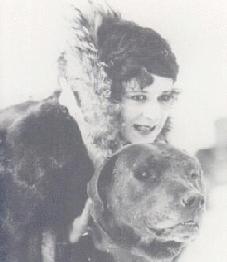
Nell Shipman was born in Vancouver in 1892. She worked as an actress in theatrical stock companies before she entered the film industry. At the age of eighteen, she sold the rights to her book, Under the Crescent, to Universal to be made into a serial. She quickly developed a reputation as a talented writer, actress, and director. In 1916, she became an overnight success for her production of God's Country and the Woman. The film is based on a James Oliver Curwood story. Shipman produced, directed, and acted in the film. She is credited as one of the first directors to shoot her films almost entirely on location, and the outdoor cinematography of God's Country and the Woman, for example, directly contributed to the film's popularity.
In 1989, film historian William K. Everson noted that many of Nell Shipman's "lost" films were being rediscovered and restored. Because she shot many of her films on location in Idaho, Boise State University began collecting her work and issued her autobiography, The Silent Screen and My Talking Heart. Shipman's book describes her location shoots in detail. An excerpt from her book conveys Shipman's style and approach toward filmmaking:
I wanted the wilderness inhabitants to blend in and out: here a wolf, there a bear, over in a tree a cougar, a raccoon washing his dinner in a stream, squirrels popping in and out, bobcats peering, porcupines bristling, all of them dissolving in montage against the dark background while I, at the bottom of the frame, dreamed it. It was the most difficult double-exposure ever attempted. (78)
Shipman continued with a string of successes with Back to God's Country (1919) and many other outdoor "wild animal pictures." Audiences were drawn to the seemingly exotic locations and "wild" animals in her films. She artfully created a persona of herself as a rugged and exotic "New Woman" of outdoor adventure. She often adapted the material of "masculine" authors such as Zane Grey, Edgar Rice Burroughs, and James Oliver Curwood. She was remarkably adept at perceiving and manipulating audience expectations. For example, she frequently cast herself against type as a strong woman "having to protect a weak and ailing husband" (Everson, 229). As Peter Morris notes, God's Country and the Woman "more than hints that male authority figures may not have a right to that authority" (204). Nell Shipman was not only an outspoken feminist and director but also innovative and daring in her technical approach to film. She frequently asked her cameramen to set up unusual or dangerous scenes. Though Everson labels her films as "often derivative in their technique" (230), they bear a recognizable authorial stamp.
By the 1920s, Shipman's films decreased in popularity, so she closed down her production company in Idaho and sold her animals to the San Diego Zoo, but she remained active as a screenwriter and novelist. Her novel Get the Woman was serialized in McCall's magazine. In the 1960s, she wrote her autobiography. She is remembered as an author, actress, and an important pioneering director of outdoor cinematography. She is one of the free-spirited women of the period who headed her own production company as producer, writer, director, and star.
See also:
Last modified: Feb. 22, 1997
Page maintained by Joseph Bishay
© 1997 All Rights Reserved.